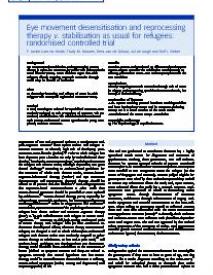Eye movement desensitisation and reprocessing therapy v. stabilisation as usual for refugees: randomised controlled trial
Abstract
Background
Eye movement desensitisation and reprocessing (EMDR) therapy is a first-line treatment for adults with post-traumatic stress disorder (PTSD). Some clinicians argue that with refugees, directly targeting traumatic memories through EMDR may be harmful or ineffective.
Aims
To determine the safety and efficacy of EMDR in adult refugees with PTSD (trial registration: ISRCTN20310201).
Method
In total, 72 refugees referred for specialised treatment were randomly assigned to 12 h (9 sessions) of EMDR or 12 h (12 sessions) of stabilisation. The Clinician-Administered PTSD Scale (CAPS) and Harvard Trauma Questionnaire (HTQ) were primary outcome measures.
Results
Intention-to-treat analyses found no differences in safety (one severe adverse event in the stabilisation condition only) or efficacy (effect sizes: CAPS −0.04 and HTQ 0.20) between the two conditions.
Conclusions
Directly targeting traumatic memories through 12 h of EMDR in refugee patients needing specialised treatment is safe, but is only of limited efficacy.
Geachte bezoeker,
De informatie die u nu opvraagt, kan door psychotraumanet niet aan u worden getoond. Dit kan verschillende redenen hebben,
waarvan (bescherming van het) auteursrecht de meeste voorkomende is. Wanneer het mogelijk is om u door te verwijzen naar de bron
van deze informatie, dan ziet u hier onder een link naar die plek.
Als er geen link staat, kunt u contact opnemen met de bibliotheek,
die u verder op weg kan helpen.
Met vriendelijke groet,
Het psychotraumanet-team.
Reference:
F. Jackie June ter Heide, Trudy M. Mooren, Rens van de Schoot, Ad de Jongh, & Rolf J. Kleber | 2016
In: The British Journal of Psychiatry, ISSN 0007-1250 | 209 | 9 | 1-8
http://bjp.rcpsych.org/content/early/2016/02/04/bjp.bp.115.167775.abstract
In: The British Journal of Psychiatry, ISSN 0007-1250 | 209 | 9 | 1-8
http://bjp.rcpsych.org/content/early/2016/02/04/bjp.bp.115.167775.abstract
Affiliation author(s):


